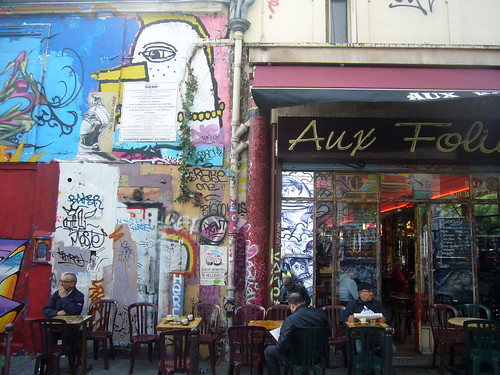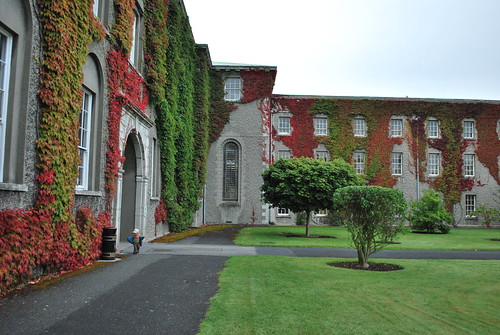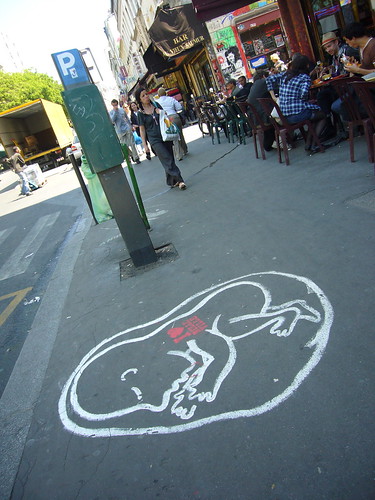04/09/10
What is it with Paris?
“I can see right away if people are from Paris or from the suburbs,” said a playground & park warden to me. “It’s a different mentality, and they behave and move differently. People from Paris are proud of their city.”
30/08/10
La concierge, Parisian overture part 2
This terrible and expensive mess I created during a tenth of a second’s inattentiveness and a draught from the balcony doors would never have happened if it weren’t for the French holidays. But now the holidays are over and the house has got back its gardienne (a warden, an occupation formerly known as a concierge before it became a derogatory), and then everything falls into place. She probably knows most of what goes on in the apartment block and so she knows when someone needs a plumber, electrician, carpenter or locksmith, and he can recommend them one. So she’s got a whole estate backing up her negotiating power with the local providers of practical jobs, and negotiate she can! I’ve never lived in a building with a concierge before so I’ve never had the chance to see how they excel in their work. And by golly, that was something! Here, I get to my point. Or, I’m not really sure yet what this has got to do with my fieldwork and research, but I have a feeling that to see a concierge work means to see an essential element in how this society works.
The way she negotiated over the phone for a better price and super fast accomplishment with a locksmith she knew, at the same time as she answered all the inhabitants who greeted her en passant for work after her holidays, and intermittently sort of put in place the Jeunet drunkard (who only had tried to help us, but who shrunk a little anyway as he knows he stinks of alcohol probably), called up carpenters in her own flat and gently told them off, commanded Leo and the bird dog not to get to close and so on, all in a firm but sort of generous way. Her charisma was that of a school teacher whom you just know you must behave your very best with, and if you do, things will go your way. I wouldn’t be surprised if Bourdieu have written extensively on la concierge in the French version of The Distinction, because her position in the French class hierarchy must be quite peculiar. I’ve heard a very nice documentary series on these kind of wardens on France Culture a while ago, but now I’ve seen one in action and I definitely want one for my block back in Oslo. (But of course we’ll never get a concierge, we’ve only got this shitty neoliberal caretaker service business providers who call themselves things like economical solutions and who might change a bulb after a week but never ever greet you and make sure that everything is all right).
29/08/10
Parisian overture, or getting a locksmith in the holiday season

Back in Belleville, - if only for a short visit
Finding a place to stay in Paris is one of the worst things I know (except from at a hotel, which is easy.) I’ve lived at six different places in the city, and almost every time some kind of trouble has been involved. (The only exception had a quite boring neighbourhood which was almost eventless in terms of fieldwork relevance.) This time, everything went unbelievably smooth. Even arriving with a small child was just enjoyable. Until I made a horrible mistake after ten minutes when I closed the high security fucking reinforced door when we were just popping across the street to get something for Leo’s supper. With a draught of wind, the door was closed with a spare key in the key hole on the inside. The next few hours involved a dozen of kind and welcoming neighbours, the wonderfully helpful cleaning lady and her wonderfully caricatural companion taken right out of a film by Jean-Pierre Jeunet (or maybe comics by Tardi), three conmen and three policemen.
26/08/10
Can a conference be a family occasion?

Early morning, Maynooth Campus
Taking one’s family along to a conference is obviously not that uncommon. “Where can I sign up for that anthropologists’ wife association?” my partner wondered, as he saw yet another man pushing a stroller along on the campus here in Maynooth. This month I’ve tried both, conference – or festival, as I often missay it – with and conference without husband and child. With is definitely not much of a festival, but it’s got other charms.
20/08/10
Structuring your presentation
(from Writing for Scholars, by Lynn P. Nygaard, 2008: 158-162)

First; Introduce your research question – simply and concretely.
Then; you can provide the necessary background or context – all the time answering the question: “why should you listen to this?”
Next, the thesis statement before its evidence.
Finally; the conclusion. Answer the question: “What is your aim in giving the presentation?”
- Tell a story with a narrative flow: A beginning, a middle and an end. Look at how the points are connected (Nygaard: 159).
The presentation should respond to four questions from the audience, corresponding to the four stages in the learning circle:
1: Why are you telling me this?
2: What is your point?
3: How is this relevant in a wider context? (Either to a real-world context or to a scholarly discourse.)
4: Allow audience to integrate what they’ve learnt into their own work (Nygaard 2008: 160-162).
08/08/10
Things to remember when presenting papers at conferences
(Points gathered both from personal experience as well as from listening to others)
* If you want to show some of the great video material you’ve worked hard to collect and that will visualize your speech wonderfully, be sure to bring any possible transformer or connection cable that might be needed with your particular Mac (which might not be the same connection cable that the earlier speaker with a Mac used)
* Make sure you know how to compensate if the visual presentation do not work (even though you followed the previous point)
* Know the text very well and don’t lose the flow of recitation
* Know the time it takes to go through every section and how slow it should be recounted (so you don’t get stressed and lose the pace when the shair shows you the 5 minutes sign)
* If you are of the sensitive kind, remember to ignore the audience when they start moving around in their chairs, yawn or flip their sheets – some people just becomes like that after sitting straight listening for two hours in a row. Very likely people will come afterwards and say that the atmosphere was just electric during the empirical quotes and it was all so moving and so on. So, either focus on the attentive faces that follow you or just turn inward and follow the flow of your text
* Please, state the purpose and aim of the presentation! What does all this lead to? In my opinion, the listeners can’t be reminded too often…
* Reading or not reading, I don’t really have any strong views, but too quick is not good, whether it is read or spoken. Neither is too many diversions from the line of argument and too many ehs…
* And now, in the all-embracive age of powerpoint, why not reflect on what the visual aids can and cannot do for exactly your purpose.
27/07/10
Balance
A little red robin just whistled outside the bedroom window. My son takes his midday nap in my lap this summer. For a long time now, he has let us know that midday laps are a waste of time, and the only way to get him to sleep is to make the environment as boring, but cosy as possible. I bunk up with a cup of tea and a novel or a pencil and paper, and for an hour or so I can slouch peacefully in the bedroom in the middle of the day.
03/06/10
A descent into eternal Paris?

Rue de Belleville, just above the metro station
What is Paris to me now, I wondered when I sat on the plane on my way south after an absence of more than two years and the experience of a couple of seminal, life-altering (no less) events. I didn’t expect to feel at home. I expected to feel a little anxiety, particularly as I was arriving late in the evening, long after dark, but that didn’t happen. Not at the metro, neither at the metro station where I changed to Line 2, my old favourite, and neither as I walked down my old street. What stuck me instead, was the bizarness of Belleville, as I’d been away for a long time. When I exit the station by the electric stairs in boulevard de la Villette, it’s dark in the street and almost deserted at this stretch of the pavement where, except for two a bit lost men playing a ghetto blaster way over the limits of the loudspeakers, nothing else than a scratching white noise coming out of them. And this morning, a screaming man walked down the street in front of the hotel. I heard his screams from far away, once every twentieth second perhaps, and then they faded away again down in the main street, like a weird human Doppler effect.


